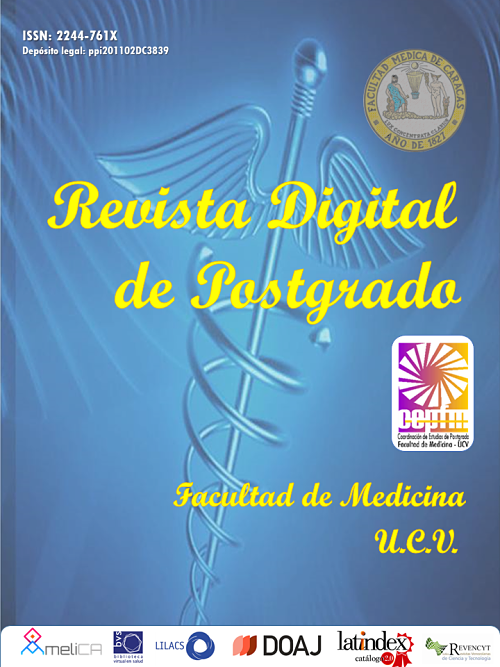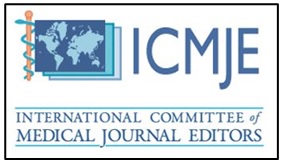Psychiatric alterations in patients with a history of SARS-CoV-2 infection
DOI:
https://doi.org/10.37910/RDP.2024.13.1.e390Keywords:
Pandemia, COVID-19, Psiquiatría, Trastornos MentalesAbstract
Objective: To characterize the mental disorders of the consulting patients of the Psychiatry Service of the University Hospital of Caracas January 2020 - January 2021, who came for the first time and had presented COVID-19 infection 3 to 6 months before consulting. Methods: An observational,
descriptive, retrospective, cross-sectional study was carried out in patients who attended the Psychiatry Service of the University Hospital of Caracas for emergencies (for the first time and successive ones) due to presenting mental pathologies during and after COVID-19 during the period January 2020-January 2021. Results: Of 718 patients, 53 who came with mental pathologies had previous COVID-19 infection, representing 7.38%. Average age 27-29 years (66.03%). The majority were female (71.69%). 77.35% came from the Capital District; 18.86% from the state of Miranda, with the predominant marital status being single with 73.58%; 56.60% were unemployed and 79.24% had no educational level. In relation to the diagnoses: major depressive disorder with anxious symptoms (30.18%), depressive disorder (18.86%), maniform episode (1.88%), acute psychotic episode (18.86%), generalized anxiety disorder (7.54%), among others. Conclusion: Psychiatric symptoms caused by COVID-19 infection appear later and persist after infection. Women expressed a greater risk of presenting symptoms related to mental health; It is associated with a high level of vulnerability due to the influence of social roles, reproductive cycle and greater psychiatric morbidity.
Downloads
References
Wang K-W., Gao J., Wang H., Wu X-L., Yuan Q-F., Guo F-Y., et al. Epidemiology of 2019 novel coronavirus in Jiangsu Province, China after wartime control measures: A population-level retrospective study. Travel Med Infect Dis. 2020;35:101654, https://doi.org/10.1016/j.tmaid.2020.101654.
Khan M., Khan H., Khan S., Nawaz M. Epidemiological and clinical characteristics of coronavirus disease (COVID-19) cases at a screening clinic during the early outbreak period: a single-centre study. J Med Microbiol. 2020;69(8):1114–23, https://doi.org/10.1099/jmm.0.001231.
Guo Y-R., Cao Q-D., Hong Z-S., Tan Y-Y., Chen S-D., Jin H-J., et al. The origin, transmission and clinical therapies on coronavirus disease 2019 (COVID-19) outbreak – an update on the status. Mil Med Res.2020;7(1):11, https://doi.org/10.1186/s40779-020-00240-0.
Wit E., van Doremalen N., Falzarano D., Munster VJ. SARS and MERS: recent insights into emerging coronaviruses. Nat Rev Microbiol. 2016;14(8):523–34, https://doi.org/10.1038/nrmicro.2016.81.
Chacón GR. La pandemia de COVID-19 en Venezuela. Resumen de las primeras 6 semanas. Alianza Venezolana Porla Salud. Disponible en: http://alianzasalud.org/la-pandemia-de-covid-19-en-venezuela-resumen-de-las-primeras-6-semanas/. Accessed September 15, 2020
Sistema Patria. COVID-19, Estadísticas Venezuela. Disponible en:https://covid19.patria.org.ve/estadisticas-venezuela/. Accessed September 17, 2022.
Amsalem D., Dixon LB., Neria Y. The Coronavirus Disease 2019 (COVID-19) Outbreak and Mental Health. JAMA Psychiatry. 2021;78(1):9, https://doi.org/10.1001/jamapsychiatry.2020.1730.
Gouraud C., Bottemanne H., Lahlou-Laforêt K., Blanchard A., Günther S., Batti S El., et al. Association Between Psychological Distress, Cognitive Complaints, and Neuropsychological Status After a Severe COVID-19 Episode: A Cross-Sectional Study. Front Psychiatry. 2021;12:725861, https://doi.org/10.3389/fpsyt.2021.725861.
Palomino-Oré C., Huarcaya-Victoria J. Trastornos por estrés debido a la cuarentena durante la pandemia por la COVID-19. Horiz Médico. 2020;20(4):e1218, https://doi.org/10.24265/horizmed.2020.v20n4.10.
Organización panamericana de la salud. Atlas de salud mental de las Américas 2020. Washington, D.C.: OPS.https://doi.org/10.37774/9789275327197.
Zhang H., Shi Y., Jing P., Zhan P., Fang Y., Wang F. Posttraumatic stress disorder symptoms in healthcare workers after the peak of the COVID-19 outbreak: A survey of a large tertiary care hospital in Wuhan. Psychiatry Res. 2020;294:113541, https://doi.org/10.1016/j.psychres.2020.113541.
Liyanage-Don NA., Winawer MR., Hamberger MJ., Agarwal S., Trainor AR., Quispe KA., et al. Association of depression and COVID-induced PTSD with cognitive symptoms after COVID-19 illness. Gen Hosp Psychiatry. 2022;76:45–8, https://doi.org/10.1016/j.genhosppsych.2022.02.006.
Preti E., Di Mattei V., Perego G., Ferrari F., Mazzetti M., Taranto P., et al. The Psychological Impact of Epidemic and Pandemic Outbreaks on Healthcare Workers: Rapid Review of the Evidence. Curr Psychiatry Rep. 2020;22(8):43, https://doi.org/10.1007/s11920-020-01166-z.
OPS. The COVID-19 HEalth caRe wOrkErs Study (HEROES). Informe Regional de las Américas. Disponible en: https://iris.paho.org/bitstream/handle/10665.2/55563/OPSNMHMHCOVID-19220001_spa.pdf?sequence=1. Accessed February 21, 2024.
Ramírez-Ortiz J., Castro-Quintero D., Lerma-Córdoba C., Yela-Ceballos F., Escobar-Córdoba F. Mental health consequences of the COVID-19 pandemic associated with social isolation. Colomb J Anesthesiol.2020;48(4):e930, https://doi.org/10.5554/22562087.e930.
OPS. Boletin informativo. Disponible en: https://www.paho.org/es/boletines- informativos. Accessed October 12, 2023.
Charlson F., van Ommeren M., Flaxman A., Cornett J., Whiteford H., Saxena S. New WHO prevalence estimates of mental disorders in conflict settings: a systematic review and meta-analysis. Lancet. 2019;394(10194):240–8, https://doi.org/10.1016/S0140-6736(19)30934-1.
Diriba K., Awulachew E., Getu E. The effect of coronavirus infection (SARS-CoV-2, MERS-CoV, and SARS-CoV) during pregnancy and the possibility of vertical maternal–fetal transmission: a systematic review and meta-analysis. Eur J Med Res. 2020;25(1):39, https://doi.org/10.1186/s40001-020-00439-w.
Wijeratne T., Crewther S. COVID-19 and long-term neurological problems: Challenges ahead with Post-COVID-19 Neurological Syndrome. Aust J Gen Pract. 2021;50, https://doi.org/10.31128/AJGP-COVID-43.
Whiteside DM., Basso MR., Naini SM., Porter J., Holker E., Waldron EJ., et al. Outcomes in post-acute sequelae of COVID-19 (PASC) at 6 months post-infection Part 1: Cognitive functioning. Clin Neuropsychol.2022;36(4):806–28, https://doi.org/10.1080/13854046.2022.2030412.
Castillo-Álvarez F., Fernández-Infante E., Campos MS., García-Mozún B. Sintomatología neuropsiquiátrica en el síndrome post-COVID. Propuesta de manejo y derivación desde atención primaria. Med Fam Semer.2022;48(4):263–74, https://doi.org/10.1016/j.semerg.2021.09.012.
Domínguez-Paredes AL., Varela-Tapia CL., Dorado-Arias V., Salazar-Núñez E., Martínez-Barro D. [Cognitive alterations in patients recovered from COVID-19 treated in Cardiopulmonary Rehabilitation]. Rev Med Inst Mex Seguro Soc. 2023;61(6):796–801, https://doi.org/10.5281/zenodo.10064351.
Carod Artal FJ. Síndrome post-COVID-19: epidemiología, criterios diagnósticos y mecanismos patogénicos implicados. Rev Neurol. 2021;72(11):384, https://doi.org/10.33588/rn.7211.2021230.
Downloads
Published
How to Cite
Issue
Section
License
Copyright (c) 2024 Luis Lira, Gustavo Benítez, María Pulido, Sineed Arias, Miguel Lira

This work is licensed under a Creative Commons Attribution 4.0 International License.
Usted es libre de:
- Compartir — copiar y redistribuir el material en cualquier medio o formato
- Adaptar — remezclar, transformar y construir a partir del material
- para cualquier propósito, incluso comercialmente.
Bajo los siguientes términos:
-
Atribución — Usted debe dar crédito de manera adecuada, brindar un enlace a la licencia, e indicar si se han realizado cambios. Puede hacerlo en cualquier forma razonable, pero no de forma tal que sugiera que usted o su uso tienen el apoyo de la licenciante.
- No hay restricciones adicionales — No puede aplicar términos legales ni medidas tecnológicas que restrinjan legalmente a otras a hacer cualquier uso permitido por la licencia.











